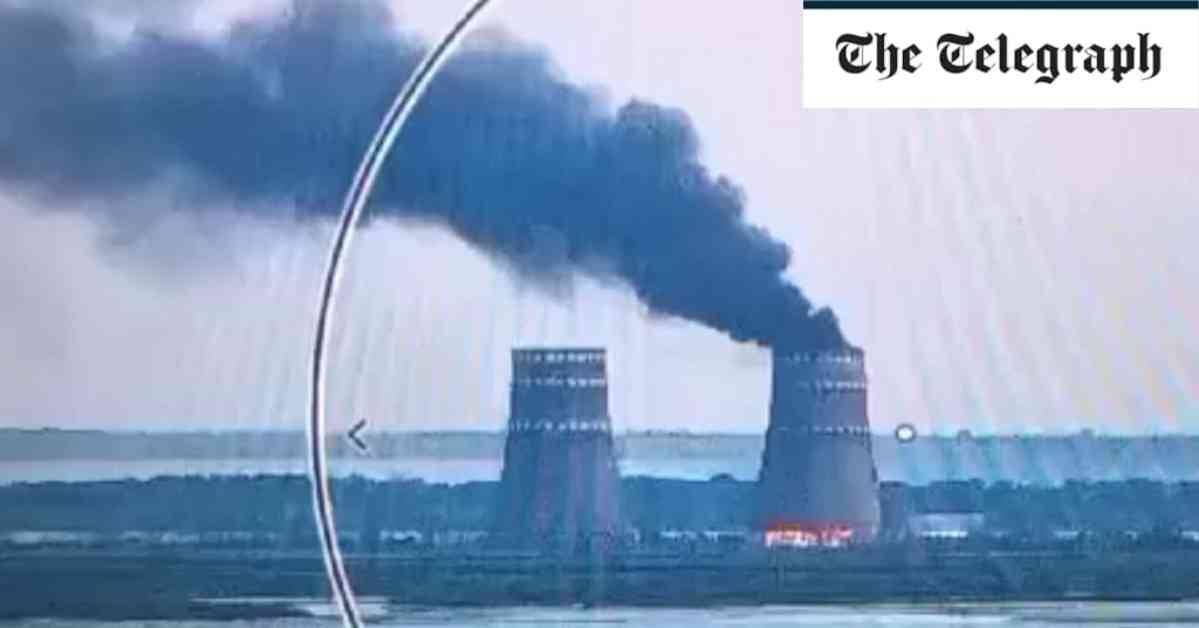The recent actions taken by Russian forces in Ukraine have shattered a long-standing taboo in warfare – the protection of nuclear power plants from attack. This unprecedented breach of international law has raised serious concerns about the safety and security of nuclear energy infrastructure in conflict zones. Let’s take a closer look at the consequences of Putin breaking sacred rules of warfare and what could happen next.
The Geneva Conventions have long prohibited the targeting of nuclear facilities in military conflicts. The Additional Protocol to the Conventions explicitly states that nuclear power plants must not become targets, even in scenarios of strategic military gain. However, the recent incident at the Zaporizhzhia nuclear power plant in Ukraine, where Russian troops reportedly set tire fires beneath one of the cooling towers, has highlighted Putin’s willingness to resort to nuclear provocation.
Nuclear power plants are considered civilian infrastructure under international law. Jeopardizing the security of these facilities not only causes blackouts and disrupts vital services like hospitals but also increases reliance on environmentally harmful fossil fuels. The attack on Zaporizhzhia and the subsequent occupation of the plant by Russian forces have put the region at risk of a potential nuclear incident.
The implications of Russia’s actions go beyond Ukraine. The assault on the Zaporizhzhia plant, as well as the attempted capture of the decommissioned Chernobyl site, have violated not only international humanitarian law but also Russia’s own national policy. The loss of external power at Chernobyl due to the fighting underscores the grave dangers posed by the conflict to nuclear facilities in the region.
The Threat to Nuclear Energy Security
Ukraine relies heavily on nuclear energy for its domestic power needs, with 50% of its energy provided by fifteen nuclear reactors. The proximity of these reactors to Russian-occupied territory raises concerns about their safety in the event of prolonged conflict. While nuclear power plants are designed to withstand certain types of attacks, they may not be prepared for the sustained environmental harm that can result from ongoing warfare.
If Russia fails to maintain the Zaporizhzhia plant to a high standard, there is a real risk of a nuclear incident that could release radioactive isotopes into the environment. The potential consequences of such an event extend beyond Ukraine, affecting neighboring countries like Russia and posing a threat to the safety and security of Eastern Europe as a whole.
The Call for International Action
In response to these developments, there have been calls for new legal and political mechanisms to protect nuclear power stations during wartime. However, implementing new legislation could complicate the existing legal framework and potentially allow rogue states to exploit loopholes in the system. The protection of nuclear facilities has long been considered fundamental, and any changes to the existing laws must be carefully considered to prevent unintended consequences.
Ukraine has called for retaliatory sanctions against Rosatom, the Russian State Atomic Energy Corporation, in response to the seizure of the Zaporizhzhia plant. However, imposing such sanctions could have wider implications for European energy infrastructure, as many nuclear reactors in the European Union depend on Russia for their fuel supply. Until alternative sources of nuclear fuel are developed, sanctions may not be a practical solution to address Russia’s actions.
The Path Forward
Despite the challenges posed by Russia’s aggression in Ukraine, there is hope for a more secure future for nuclear energy infrastructure in conflict zones. By reducing Europe’s dependence on Russian nuclear industry, countries can send a clear message that exploiting nuclear power plants during warfare will not be tolerated. Developing alternative sources of nuclear fuel and fabrication capabilities can help to mitigate the risks associated with relying on Russian resources.
It is crucial for the international community to take action and rebuild the safeguards that have long protected nuclear energy infrastructure in conflict zones. Both Moscow and Kyiv must cease their attacks on nuclear facilities and commit to upholding the principles that have prevented disaster thus far. By working together to strengthen international laws and norms surrounding nuclear energy security, we can ensure that the Ukraine war is the last to involve such threats to nuclear facilities.
In conclusion, the consequences of Putin breaking sacred rules of warfare are far-reaching and pose a significant risk to nuclear energy security in conflict zones. It is imperative that the international community takes decisive action to protect nuclear facilities and prevent further escalation of the conflict in Ukraine. Only by upholding the principles of international humanitarian law can we ensure the safety and security of nuclear energy infrastructure for future generations.












